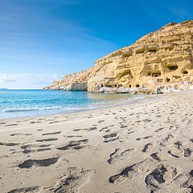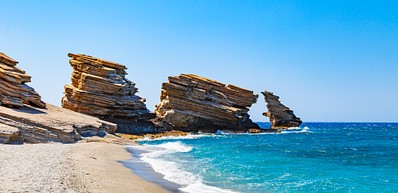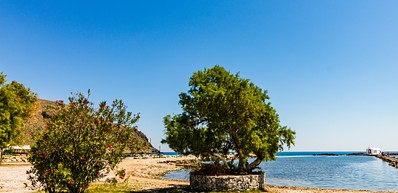
-
![Matala Beach]() Provided by: Georgios Tsichlis/Shutterstock.com
Provided by: Georgios Tsichlis/Shutterstock.com

Our travel guides are free to read and explore online. If you want to get your own copy, the full travel guide for this destination is available to you offline* to bring along anywhere or print for your trip.
*this will be downloaded as a PDF.Price
€4,95
Matala
The guide was updated:Located on the southern coast of Crete and part of the Heraklion prefecture, the village of Matala has an organized sandy beach with crystal clear deep water and cliffs featuring caves carved in the rock, which you can visit. These caves were once used as residences, most famously by the hippies in the 1960s and 70s. Every year in June, the three-day Matala Beach Festival takes place, attracting many visitors to the village.
Useful Information
- Address: Matala, Heraklion, Crete
Digital Travel Guide Download
Our travel guides are free to read and explore online. If you want to get your own copy, the full travel guide for this destination is available to you offline* to bring along anywhere or print for your trip.
*this will be downloaded as a PDF.Price
€4,95

On the northwest coast of Cape Gramvousa, in a bay formed between the lesser capes of Tigani and Vouha, lies the sea-lagoon of Balos. A quiet beach, opposite the two Gramvousa islands (Wild and Tame), it features warm, turquoise waters and white sand. The sand is actually partly composed of minutely crushed sea-shells, which impart a pinkish hue to it. The water immediately off shore is shallow, but deepens elsewhere.
Read more

Matala
Located on the southern coast of Crete and part of the Heraklion prefecture, the village of Matala has an organized sandy beach with crystal clear deep water and cliffs featuring caves carved in the rock, which you can visit. These caves were once used as residences, most famously by the hippies in the 1960s and 70s. Every year in June, the three-day Matala Beach Festival takes place, attracting many visitors to the village.
Read more

Falassarna Beach
Falassarna Beach is a series of large sandy stretches that together run on for 3 km. The main beach of Pacheia Ammos (Deep Sands), one of the most popular in Crete, is made up of white sand and turquoise waters. It has sun-beds and umbrellas, facilities for water-sports and courts for beach-volleyball.
If you wish to avoid the crowds at Pacheia Ammos, you can seek out one of the other strands which are to be found nearby, both to the north and south. They are smaller, rather isolated and without facilities; some have pebbles, others sand: but all are ideal for chilling out.
Because of the strong winds that blow here, Falassarna is an ideal destination for wind surfing lovers.
Read more

Elafonissi & Kedrodasos
Elafonissi beach is one of the most emblematic of the island, and is featured on countless postcards. It can be found 80 km from Chania. Elafonissi is a small island, connected to the Cretan mainland by a shallow crossing of several hundred meters. The whole area, which is part of the NATURA 2000 programme, is characterized by pale sands, shallow and crystal-clear waters turquoise in colour, and small pink patches made up from crushed sea-shells.
South of Elafonissi is another area of wild and remarkable beauty: Kedrodasos, also part of the NATURA 2000. Access can be by car (up to a certain point) or on foot following the E4 walking-route from the beach of Elafonissi itself. Dunes of white sand and ancient cedars cover the vicinity. The main beach is sandy and also boasts crystal-clear turquoise waters. Along the coastal path from Elafonissi to Kedrodasos there are small deserted coves. Unlike Elafonisi, Kedrodasos is absolutely unspoilt and because of its isolation nudists like to come here.
Read more

Gialiskari Beach
Following the road east out of Paleochora, you will find a nice and secluded beach, Gialiskari. Actually Gialiskari is a twin beach, one each side of a small spit of land projecting into the sea, but both equally charming and idyllic. The west side is made of small pebbles, the east has pale sand. The water is clear and deep. The area is slightly developed, with a café-canteen and a few umbrellas and sun-beds. To the east grow plentiful tamarisks, which shed a natural shadow and give relief from the hot suns of South Crete.
Read more

Preveli
Preveli Beach, with its iconic riverside palm-groves, is one of the most famous and beloved beaches in Crete. The forest of palms, covering some 10 acres, is the second largest of its sort in Crete and consists of an endemic species: the Theophrastus palm. A walk on the banks of the river or a pedalo ride through the palms and oleanders and into the gorge can be unforgettable experiences. Preveli beach is located at the mouth of the gorge, where the river Kourtaliotis ends in a delta. It has pale sands and a stony bottom to the crystalline water.
Read more

Triopetra & Agios Pavlos
Triopetra beach is sandy, pretty much unspoilt, featuring crystal-clear water and breathtaking sunsets. Its name means "Three Rocks" and refers to the impressive rocks that characterise its landscape.
Next to Triopetra, you'll find the charming Agios Pavlos beach. The vast dunes that enclose the beach are its chief attraction and they can attain up to 30 feet in height. The beach itself is sandy, with very clear water and a sea-bed that begs to be explored. In the middle of the beach there are some sea-worn caves.
Read more

Kommos Beach
Kommos is a single huge beach divided for convenience into two: the north part, called Potamos, is one of the largest venues for nudism. It is secluded and without organization; no hotels and catering facilities exist in the area as it has been classified as a protected archaeological zone. On every side there are tamarisks, carobs and sand-dunes.
The southern part, is by contrast very well-organized with umbrellas, sunbeds, showers and a lifeguard. Both sections have sand, clear water and large smooth rocks in the sea. As other beaches, they are exposed to the west winds, which can create large waves.
Read more

Belegrina (Chrysi Island)
Belegrina Beach on the uninhabited Chrysi Island is known as the "golden beach" due to the colour of its sand, which can also have white and pink shades. It is a pristine beach with crystalline turquoise waters, ideal for snorkeling. On Chrysi Island, there survives a large cedar forest of some 85 acres, with large and impressive specimens.
Read more

Voulisma
At a distance of 12 km south of Agios Nikolaos is the settlement of Istron. You will reach it as you pass along the main national road east from Agios Nikolaos towards Ierapetra or Siteia. Located here is Voulisma, a large beach with fine white sand and shallow, blue waters. It is developed, with umbrellas, sunbeds, showers, water-sports and a lifeguard. It is a good location for young children, as the water deepens only gradually. By one end there is a canteen for food and drinks.
Read more

Vai Beach
Vai, with its palm forest and its lovely beach, attracts each year a huge number of visitors. The palm forest — the biggest on the island, with some five thousand specimens of the Theophrastus palm — covers about 70 acres. The long beach has blue-green water, fine sand and pebbles. It is very organized, featuring umbrellas, sunbeds, canteens and refreshments, as well as opportunities for water sports.
Read more

Platanias
In Platanias accommodation options, services, eateries and bars abound. Being one of the most cosmopolitan destination in Crete, here you will encounter every summer throngs of Greek and foreign tourists.
Platanias beach is sandy and extends for 3 km. Well-organized, it is suitable for all sorts of water-sports and has the usual umbrellas, sunbeds, lifeguards and beach bars.
Read more

Stavros
On the northwest flank of the Akrotiri peninsula is Stavros, a sheltered bay with sand and turquoise waters. It is organized with umbrellas, sunbeds, showers and a lifeguard, as well as some chances for water-sports. It was here that Michaili Kakoiannis filmed ‘Zorba’, based on the book by Kazantzakis, winning three Oscars in 1964.
Read more

Georgioupoli
Georgioupoli is a seaside resort with a huge sandy beach some 12 km long. It has clear blue-green waters that drop away suddenly. Well-organized, the beach is supplied with umbrellas, sunbeds and showers with lots of options open for water-sports enthusiasts. Though there is a lifeguard here, you must also take care if you choose to swim as the sea hereabouts has strong currents.
Read more

Agia Pelagia
Agia Pelagia is one of the most popular summer destinations in the Heraklion prefecture. It is 21 km from Heraklion and has a long beach of some 450 metres with fine sand. The water is crystalline, blue and almost always calm as the sea here is shut in within the bay that opens to the east, and so is protected from the northerly winds.
The beach is fully organised with sun beds, umbrellas, showers, a lifeguard, water-sports and more. A diving school operates here too. The village doesn't lack tavernas, restaurants, cafeterias, bars, hotels of all grades, rentable rooms and apartments.
Read more

Potamos Beach
Potamos Beach is located in Malia, 37 km east of Heraklion. The city is a popular destination with a vibrant nightlife and several beaches, of which Potamos is one of the least crowded. It is named after a small river that flows there, forming a wetland of great importance. It is some 700 m long, with sand, blue crystalline waters and a few tamarisks around. If you go at the start of autumn, you will chance upon the white sea-lilies that grow in the sand: the heralds of autumn.
Potamos is well organized: you will find sunbeds, umbrellas, toilets, showers and plenty of water-sports opportunities.
Read more

Fragokastello Beach
Frangokastello beach is named after the Venetian fort that towers over its sandy dunes and shallow turquoise waters. It is located on a small plain southeast of the White Mountains to the south of Chania. Organized, with umbrellas, sunbeds and showers, it gets crowded during high season. The gently shelving waters make it suitable for families with young children.
Read more


